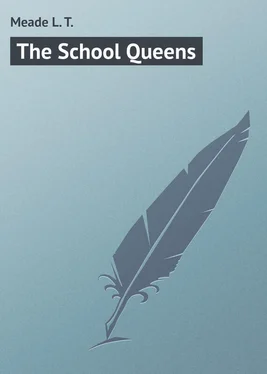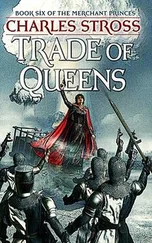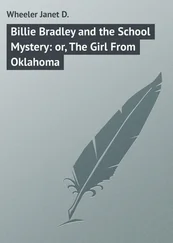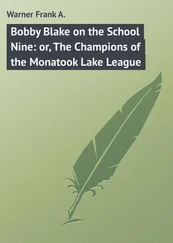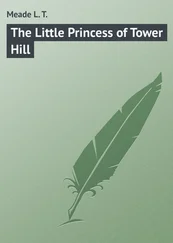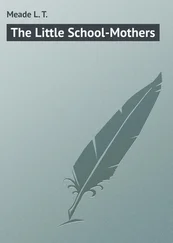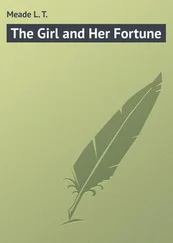L. Meade - The School Queens
Здесь есть возможность читать онлайн «L. Meade - The School Queens» — ознакомительный отрывок электронной книги совершенно бесплатно, а после прочтения отрывка купить полную версию. В некоторых случаях можно слушать аудио, скачать через торрент в формате fb2 и присутствует краткое содержание. Жанр: foreign_children, foreign_prose, foreign_language, на английском языке. Описание произведения, (предисловие) а так же отзывы посетителей доступны на портале библиотеки ЛибКат.
- Название:The School Queens
- Автор:
- Жанр:
- Год:неизвестен
- ISBN:нет данных
- Рейтинг книги:3 / 5. Голосов: 1
-
Избранное:Добавить в избранное
- Отзывы:
-
Ваша оценка:
- 60
- 1
- 2
- 3
- 4
- 5
The School Queens: краткое содержание, описание и аннотация
Предлагаем к чтению аннотацию, описание, краткое содержание или предисловие (зависит от того, что написал сам автор книги «The School Queens»). Если вы не нашли необходимую информацию о книге — напишите в комментариях, мы постараемся отыскать её.
The School Queens — читать онлайн ознакомительный отрывок
Ниже представлен текст книги, разбитый по страницам. Система сохранения места последней прочитанной страницы, позволяет с удобством читать онлайн бесплатно книгу «The School Queens», без необходимости каждый раз заново искать на чём Вы остановились. Поставьте закладку, и сможете в любой момент перейти на страницу, на которой закончили чтение.
Интервал:
Закладка:
“She has gone up to see the Cardews.”
“Who are the Cardews?”
“Why, surely, Mags, you must have heard of them?”
“You don’t mean,” said Maggie with a laugh, and showing a gleam of strong white teeth, “the two little ladies who live in a bandbox?”
“Oh, you really must not laugh at them,” said Isabel, immediately on the defensive for her friends; “but they do lead a somewhat exclusive life. Molly has gone up to the Castle, as we always call Meredith Manor, to announce your arrival, and to ask permission to bring you there to a tennis-party this afternoon; so you will soon see them for yourself. Now, come in and say good-morning to the mater; she is longing to see you.”
“Hello, Peterkins!” called out Maggie at that moment, as a small boy with a smut across his face suddenly peeped round a door.
“I’m not Peterkins!” he said angrily.
Maggie laughed again. “I am going to call you Peterkins,” she said. “Is this one of the little brothers, Belle?”
“Yes. – Come here at once, Andrew, and speak to Miss Howland.”
The boy approached shyly. Then his eyes looked up into the queer face of the girl who looked down at him. The sulkiness cleared away from his brow, and he said, in an eager, hurried, half-shy, half-confidential way, “I say, do you like rabbits?”
“Dote on ’em,” said Maggie.
“Then I’m your man, and I don’t mind being Peterkins to you; and will you – will you come and see mine? I’ve got Spot-ear, and Dove, and Angelus, and Clover. And Jack, he has five rabbits, but they’re not near as nice as mine. You’ll come and see my rabbits, won’t you, Miss – Miss–”
“Oh, I am Maggie,” said the girl. “I’ll come and see your rabbits, Peterkins, in a minute; and I won’t look at Jack’s; but you must let me talk to your mother first.”
“There you are, Maggie,” said Belle when the boy had disappeared; “fascinating Andrew in your usual way; and Jack will be just furious, for he’s the elder, you know, and he has a temper, and you mustn’t set one of them against the other – promise you won’t.”
“Trust me,” said Maggie. “Peterkins is a nice little fellow, and I’ll manage Jackdaw too.”
“You don’t mean to say you’ll call them by those names?”
“Yes, yes. I always have my own way with people, as you know.”
“Indeed I do. Oh, come along, you queer creature. Here’s the darling mums. Mater dearest, here is Maggie Howland.”
“Delighted to see you, my dear,” said Mrs. Tristram. “I hope you are not tired after your journey from town.”
“Not in the least, thank you, Mrs. Tristram,” said Maggie, speaking in a voice of very peculiar quality; it was sweet and rich and full of many intonations. She had the power of putting a world of meaning into the most commonplace expressions.
Mrs. Tristram had not seen Maggie before, and it was Mr. Tristram who had been completely bowled over by the young lady just at Christmas-time.
“I bid you a hearty welcome to the rectory,” said the good clergyman’s wife, “and I hope you will have a pleasant time with my children.”
“I’ll have a fascinating time,” said Maggie. “I’m just too delighted to come. It was sweet of you to have me; and may I, please, give you a kiss?”
“Of course you may, dear child,” said Mrs. Tristram.
Maggie bestowed the kiss, and immediately afterward was conducted to her room by the worshiping Belle.
“I do hope you’ll like it,” said Belle in an almost timorous voice. “I prepared it for you myself.”
“Why, it’s sweet,” said Maggie, “and so full of the country! Oh, I say, what roses! And those carnations – Malmaisons, aren’t they? I must wear a couple in this brown holland frock; they’ll tone with it perfectly. What a delicious smell!”
Maggie sniffed at the roses. Belle lounged on the window-seat.
“Molly will be jealous,” she said. “Think of my having you these few moments all to myself!”
“I am delighted to come, as you know quite well,” replied Maggie. “It’s all right about school, isn’t it, Belle?”
“Yes, quite, quite right. We are to join you there in September.”
“It’s a perfectly splendid place,” said Maggie. “I will describe it to you later on.”
“But can it be nicer,” said Belle, “than our darling school at Hanover?”
“Nicer!” exclaimed Maggie. “You couldn’t compare the two places. I tell you it’s perfect. The girls – well, they’re aristocratic; they’re girls of the Upper Ten. It’s the most select school. You are in luck to be admitted, I can tell you. You will learn a lot about society when you are a member of Mrs. Ward’s school.”
“But what possible good will that do us when we are never going into it?” said Belle.
Maggie slightly narrowed her already narrow eyes, took off her hat, and combed back her crisp, dark hair from her low, full, very broad forehead. Then she said, with a smile, “You are to stay two years at Mrs. Ward’s, are you not?”
“Yes, I think that is the arrangement.”
“And I am to stay there for two years,” said Maggie; “I mean two more. I will ask you, Isabel Tristram, what good society is worth at the end of your two years. I expect you will tell me a very different story then.”
At this moment there came a hurried, nervous, excited knock at the room door.
“Aren’t you coming, Miss – Miss – Maggie? Clover and Dove and Spot-ear and Angelus are all waiting. Their hutch is beautiful and clean, and I have all their lettuces waiting for them just outside, so they sha’n’t begin to nibble till you come. Do, do come, please, Miss Maggie.”
“Of course I will, my darling Peterkins,” replied Maggie in her joyful voice. “Oh, this is – this is – this is fun! – Come along, Belle; come along.”
“But don’t let poor Jack get into a temper,” said Isabel in a half-frightened whisper.
Maggie took no notice of her. She opened the bedroom door and flew downstairs, holding the dirty, hot little hand of Andrew, alias Peterkins, while Isabel followed in their wake.
In a far-away part of the rectory garden, on a bit of waste land at the other side of the great vegetable garden, were two hutches which stood side by side, and these hutches contained those most adorable creatures, the pets, the darlings of the Tristram boys.
The Tristram boys were aged eleven and ten years respectively. Jack was eleven, Andrew ten. They were very sturdy, healthy, fine little fellows. At present they went to a good day-school in the neighborhood, but were to be sent to a boarding-school about the same time as their sisters were to begin their education at Aylmer House in Kensington. Their passion above all things was for pets. They had tried every sort: white mice (these somehow or other were sacrificed to the reigning cat) and waltzing mice (that shared an equally luckless fate); these were followed by white rats, which got into the garden and did mischief, and were banished by order of the rector, who was a most determined master in his own house. Dogs were also forbidden, except one very intelligent Airedale, that belonged to the whole family and to no one in particular. But the boys must find vent for their passion in some way, and rabbits were allowed them. At the present moment Jack owned five, Andrew four.
In trembling triumph, Andrew brought his new friend to see his darlings. He greatly hoped that Jack would not appear on the scene just now. While Maggie was up in her bedroom taking off, her hat, he had, with herculean strength, managed to move an old wooden door and put it in such a position that Jack’s hutch was completely hidden, while his hutch shone forth in all its glory, with those fascinating creatures Spot-ear, Angelus, Dove, and Clover looking through their prison-bars at the tempting meal that awaited them.
Читать дальшеИнтервал:
Закладка:
Похожие книги на «The School Queens»
Представляем Вашему вниманию похожие книги на «The School Queens» списком для выбора. Мы отобрали схожую по названию и смыслу литературу в надежде предоставить читателям больше вариантов отыскать новые, интересные, ещё непрочитанные произведения.
Обсуждение, отзывы о книге «The School Queens» и просто собственные мнения читателей. Оставьте ваши комментарии, напишите, что Вы думаете о произведении, его смысле или главных героях. Укажите что конкретно понравилось, а что нет, и почему Вы так считаете.
